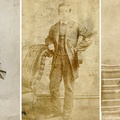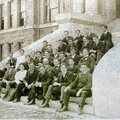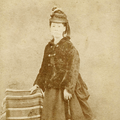"My grandfather grew up watching lynchings in the small town where he grew up. Whenever something went wrong between adults, they would decide whether the person was guilty or not without a courtroom debate. The townspeople would just assume that the person was guilty and lynch them. As a child, my grandfather would climb trees and see the crazy town. The horrific scenes he saw instilled in him a strong sense of morality, and he began to aspire to a career in law and think about what is important as a person," says Kit Lynch (maiden name: Kit), Carr's granddaughter who currently lives in Southern California.
Here, Kit talks about his memories of Carr and his beliefs.
* * * * *
Hiring a Japanese-American woman as secretary: "Waka" from the internment camp
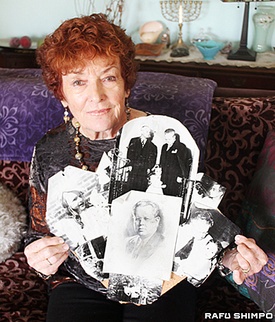
Kit is the eldest daughter of Robert Carr, Carr's eldest son. "My grandfather loved me very much as his first grandchild. And I loved him very much. He was the best grandfather in the world. I often danced and sang with him."
In 1943, shortly after Kit was born, Carr left his position as governor and returned to his career as a lawyer. He went to the Amichi Internment Camp in Colorado and hired Wakako Domoto, a Japanese-American who had been interned there, as his secretary.
Wakako grew up in Oakland, California, and studied at Stanford University before being sent to the camp. She helped out with the administrative work of her family's landscaping business. After being hired, she left the camp and worked as a secretary at Carr's home in Denver for six months.
But as soon as Wakako started working at Carr's house, people around her said, "She's Japanese. She might strangle the baby." Carr responded by saying, "That's nonsense!"
"Waka was a very kind and caring girl, like a cherry blossom. But just because she was Japanese, people thought she would kill me as a baby."
Carr was of the opinion that women should not stay at home but should go out into society and play an active role. He also told Wakako, "You don't have to do housework. Instead, I want you to go to school. I want you to get an education and acquire expertise." While working for Carr, Wakako attended a secretarial school and literally acquired expertise.
After the war, Wakako returned to California with her family and worked as a secretary at a government agency in Sacramento.
"My grandfather was a groundbreaking thinker for his time. He never got caught up in race, and in addition to Waka, he hired an African-American as a receptionist in the governor's office when he was governor. The receptionist in the governor's office is the first person people who come to see the governor meet. He hired people for such important positions, regardless of race."
There is also this episode: One day, while Carr was eating at a restaurant, an African-American couple walked in. The restaurant refused to let them in. Carr and his friends, who saw this, got up from their seats and left the restaurant. "My grandfather wanted to show through his actions that if they discriminate against African-Americans, we won't eat at that restaurant."
Don't judge people by their ancestry
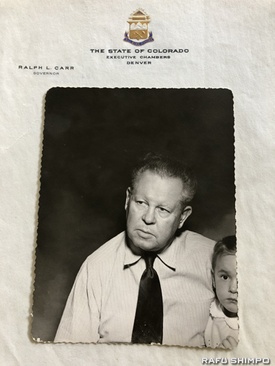
Why did Carr defend Japanese-Americans so much?
"It's not that my grandfather particularly liked Japanese people or Japanese Americans. He just believed that you shouldn't judge people by their ancestry (heritage). That's why he thought the hostility toward Japanese residents at the time was wrong. He had a strong belief that people should be judged by their actions and character," says Kit.
"Some people say that (defending Japanese Americans) was political suicide, but my grandfather never regretted his actions. The United States later apologized to Japanese Americans. This was the right course for the United States to take. He was simply doing the right thing."
The accuracy of Carr's argument is proven by the achievements of the Japanese-American troops who fought with loyalty and patriotism to the country of their birth, America.
My grandfather taught me: "Do the right thing"
What do you think about current immigration policy?
"I was always with my grandfather. Japanese people were good at agriculture and produced wonderful crops. My grandfather often took me to the Japanese fruit and vegetable market."
Kit says that from an early age, she grew up eating fruits such as cherries, grapes, and watermelons grown by Japanese farmers. "After the war, when I was about four years old, we went to a Japanese market and the owner of the market told my grandfather that someone had burned down his house. We didn't know who the culprit was, but there was a possibility that it was someone who had discriminatory feelings towards Japanese people at the time, so my grandfather and I went immediately to see the owner's burned house."
When he arrived at the scene, all that remained was the chimney. Carr contacted the insurance company to see if the Japanese family's house could be rebuilt.
"My grandfather was a caring man. 'Do the right thing,' was his sentiment."
Kit Carr's genes have been passed down to him. Kit has participated in civil rights movements all over the United States. Regarding the current immigration policy, he said, "People from Central and South America have had the same experiences as Japanese people. We must not repeat the same mistakes. I was able to endure it for four years, but after eight years, I can't endure it any more."
A life of fighting for justice
After losing the election for the U.S. Senate, Carr returned to his law career and became a trustee of his alma mater, the University of Colorado. He ran for governor again in the 1950 gubernatorial election, but fell ill one month before the election and passed away on September 22nd of the same year at the age of 62. He had spent his life fighting for justice.
Nowadays, Mr. Carr's name can be seen everywhere in Colorado. A bronze statue honoring his achievements is displayed at the Colorado Supreme Court, and a commemorative plaque is embedded in the State Capitol. In 2008, a section of Highway #285 was named the "Ralph Carr Memorial Highway." This road was once used by Japanese residents from California when they entered Colorado.
Kit says, "I want to express my gratitude to the Japanese American community. They never forgot about my grandfather. The Japanese American community erected a bust of him in Sakura Square in Denver's Japantown to commemorate his achievements. Now, my grandfather's name is engraved all over the government buildings in the state capital. In this way, my grandfather's name lives on to this day, undiminished."
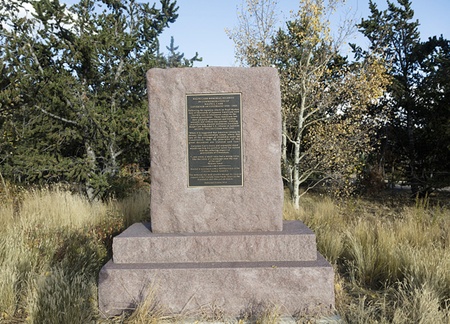
*This article is reprinted from the Rafu Shimpo (January 3, 2020).
© 2020 Junko Yoshida / Rafu Shimpo


